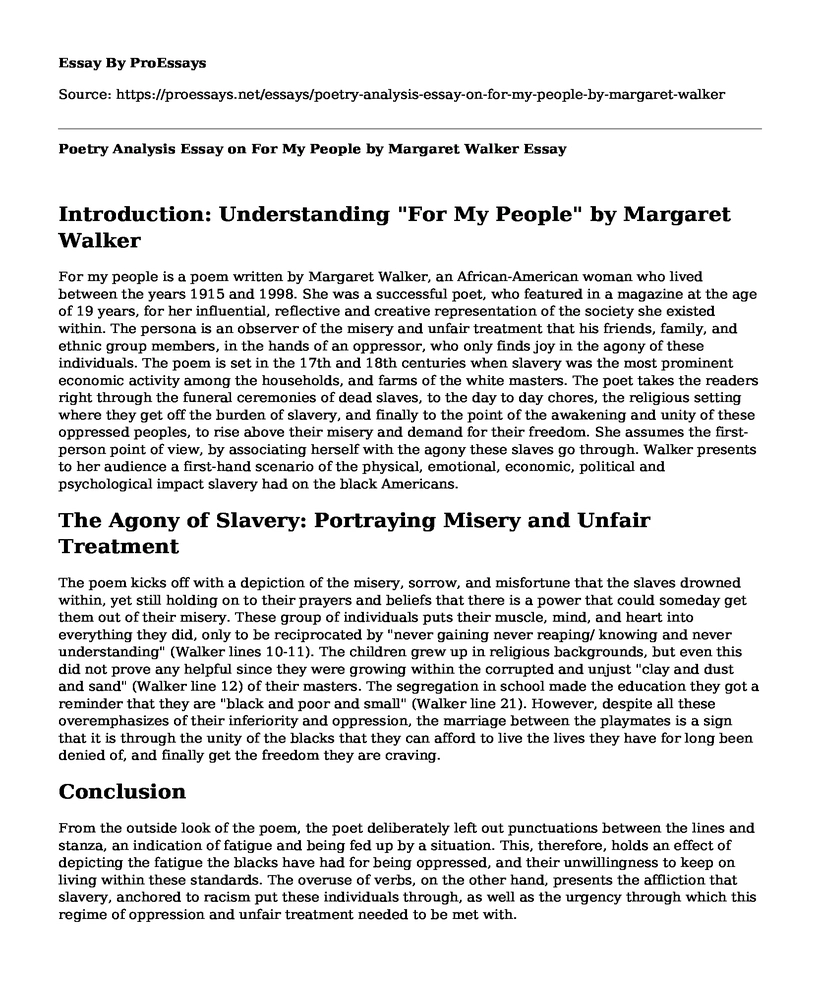Introduction: Understanding "For My People" by Margaret Walker
For my people is a poem written by Margaret Walker, an African-American woman who lived between the years 1915 and 1998. She was a successful poet, who featured in a magazine at the age of 19 years, for her influential, reflective and creative representation of the society she existed within. The persona is an observer of the misery and unfair treatment that his friends, family, and ethnic group members, in the hands of an oppressor, who only finds joy in the agony of these individuals. The poem is set in the 17th and 18th centuries when slavery was the most prominent economic activity among the households, and farms of the white masters. The poet takes the readers right through the funeral ceremonies of dead slaves, to the day to day chores, the religious setting where they get off the burden of slavery, and finally to the point of the awakening and unity of these oppressed peoples, to rise above their misery and demand for their freedom. She assumes the first-person point of view, by associating herself with the agony these slaves go through. Walker presents to her audience a first-hand scenario of the physical, emotional, economic, political and psychological impact slavery had on the black Americans.
The Agony of Slavery: Portraying Misery and Unfair Treatment
The poem kicks off with a depiction of the misery, sorrow, and misfortune that the slaves drowned within, yet still holding on to their prayers and beliefs that there is a power that could someday get them out of their misery. These group of individuals puts their muscle, mind, and heart into everything they did, only to be reciprocated by "never gaining never reaping/ knowing and never understanding" (Walker lines 10-11). The children grew up in religious backgrounds, but even this did not prove any helpful since they were growing within the corrupted and unjust "clay and dust and sand" (Walker line 12) of their masters. The segregation in school made the education they got a reminder that they are "black and poor and small" (Walker line 21). However, despite all these overemphasizes of their inferiority and oppression, the marriage between the playmates is a sign that it is through the unity of the blacks that they can afford to live the lives they have for long been denied of, and finally get the freedom they are craving.
Conclusion
From the outside look of the poem, the poet deliberately left out punctuations between the lines and stanza, an indication of fatigue and being fed up by a situation. This, therefore, holds an effect of depicting the fatigue the blacks have had for being oppressed, and their unwillingness to keep on living within these standards. The overuse of verbs, on the other hand, presents the affliction that slavery, anchored to racism put these individuals through, as well as the urgency through which this regime of oppression and unfair treatment needed to be met with.
Work Cited
Walker Margaret. For my people. This is My Century: New and Collected Poems University of Georgia Press. 1989
Cite this page
Poetry Analysis Essay on For My People by Margaret Walker. (2022, Jul 29). Retrieved from https://proessays.net/essays/poetry-analysis-essay-on-for-my-people-by-margaret-walker
If you are the original author of this essay and no longer wish to have it published on the ProEssays website, please click below to request its removal:
- Comparative Essay Example: Alchemist vs. Great Expectations
- Essay Sample on Transcendentalism and Self-Identity: Dickinson and Whitman's Poetry
- The Duality of a Man with Enron and the Lord of Flies: Paper Example
- Margaret Atwood's Critical Literacy and Biography Essay Example
- Creativity and Rationality in Charlotte Gilman's The Yellow Wallpaper
- Similarities of Beowulf, Hamlet, Things Fall Apart, and The Things They Carried
- Essay Example on Foreshadowing in Steinbeck's 'Of Mice and Men'







